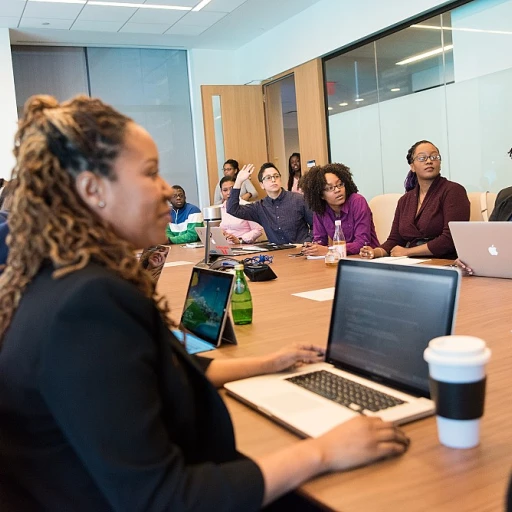
The Evolving Role of a Chief Human Resources Officer
Understanding the Changing Dynamics of HR Leadership
In today's competitive business landscape, the role of a Chief Human Resources Officer (CHRO) is continuously evolving. As companies strive for success, the responsibilities of a CHRO now extend far beyond traditional HR tasks. They must navigate complex challenges, balancing both human and strategic elements to foster business growth.
One significant area of evolution is the integration of data analytics into HR strategies. By leveraging data-driven insights, CHROs can contribute to strategic decision-making processes, enhancing talent management and aligning employee goals with business objectives. This shift towards informed decision-making empowers HR leaders to provide valuable support in achieving long-term success.
Furthermore, CHROs are increasingly expected to collaborate with other executives, including CEOs and executive consultants, to develop comprehensive leadership development programs. By participating in management consulting and consulting services, HR leaders can gain access to expert coaching and market trends that inform smarter business decisions.
With such an expanded role, a successful CHRO must foster a strong link between HR initiatives and overall corporate strategy. Their leadership is pivotal not only in nurturing talent but also in steering organizational change. This dynamic nature of the role necessitates continuous learning and adaptation, ensuring HR practices evolve with market demands.
For more on how strategic leadership can optimize HR processes, consider exploring these key elements in cost management for HR leaders.
Key Skills Required for a Successful CHRO
Key Competencies for Success in HR Leadership
In the fast-paced world of human resources, particularly for those eyeing the role of Chief Human Resources Officer (CHRO), there's a blend of skills and qualities that are essential for effective functioning. As the HR landscape evolves, these competencies not only involve traditional HR tasks but also encompass strategic and executive capabilities to support business objectives.
For instance, strategic thinking and decision-making are vital as CHROs navigate market trends and talent management. The ability to anticipate and adapt to changes is crucial, whether you’re working in consumer products or spearheading initiatives in a federal government setting. The insights gathered from data analytics can significantly inform your HR strategies, making analytical skills imperative in today’s environment.
- Leadership and Management: CHROs must possess a robust leadership skill set to coach and develop both HR teams and broader organizational leaders, aligning HR goals with business objectives.
- Consultation and Executive Experience: Leveraging executive consulting services can provide valuable insights, enhancing the executive search and talent acquisition processes, ensuring optimal team composition.
- Communication and Influencing: Effective communication is key for a CHRO to advocate changes, foster a collaborative environment, and influence top executives and the CEO on strategic decisions.
- Adaptability: As the business environment constantly shifts, brandishing skills in change management ensures the CHRO can guide the organization through transformations seamlessly.
The role of a CHRO demands a high degree of business acumen. This involves understanding consumer needs, leveraging management consulting techniques, and helping businesses steer towards long-term success. A well-rounded CHRO not only aims to manage talent but also elevates the entire organization by applying strategic insights gained through executive consultants.
Leveraging Executive Consultant Services for HR Leadership
Maximizing the Potential of Executive Consultant Services
In today's fast-paced business environment, leveraging executive consultant services has become an indispensable strategy for human resources leadership. As a chief human resources officer (CHRO), collaborating with experienced consultants can significantly enhance your organization's strategic decision making and talent management capabilities. With a focus on providing specialized insights and expertise, executive consultants play a pivotal role in helping businesses navigate complex challenges. Their understanding of market trends and data analytics enables them to offer valuable perspectives that support long term planning and the development of effective talent strategies. Executive consulting services offer several key benefits to both the CHRO and the broader leadership team:- Strategic Insights: With their extensive experience in various industries, including consumer products and federal government sectors, executive consultants offer strategic insights that help shape innovative HR initiatives. Learning from their expertise can lead to more effective human resources practices.
- Leadership Development: Executive coaching services aid in identifying and nurturing leadership potential within the organization. This ensures a robust pipeline of future leaders who are well-equipped to guide the company toward its vision.
- Executive Search and Support: Consultants also facilitate executive search efforts, ensuring that the organization is able to attract top talent. Their support extends beyond recruitment, offering assistance in onboarding and integrating new leaders into the company culture.
- Enhancing Team Performance: Building a strong HR team is essential for any successful organization. Executive consultants provide guidance on optimizing team dynamics and performance, helping HR leaders create an environment that fosters collaboration and innovation.
Building a Strong HR Team with Executive Support
Strengthening HR Teams with Strategic Executive Support
In today's rapidly changing business environment, building a formidable HR team is crucial for driving organizational success. A Chief Human Resources Officer (CHRO) often faces the challenge of aligning HR strategies with overall business objectives. Leveraging executive consulting services can provide essential support to make this task achievable. One of the primary roles of an executive consultant is to provide insights and strategic advice that bolster HR leadership. These consultants bring a wealth of experience from varied industries, such as consumer products, marketing sales, and management consulting. This diverse expertise can help HR teams gain new perspectives and facilitate effective decision-making. An HR team supported by executive consulting services can also benefit from tailored leadership development programs. These programs are instrumental in cultivating the skills required for successful talent management. By focusing on personalized coaching, HR leaders can harness their unique strengths to propel the organization forward. Executive search firms specifically offer valuable assistance in identifying and attracting top-tier talent to join the HR team. These firms use their extensive networks and industry knowledge to conduct thorough market research, ensuring a strategic match between the organization's needs and potential candidates' capabilities. Moreover, executive consultants often employ data analytics to provide HR teams with actionable insights. This method helps in predicting market trends and understanding long-term challenges that businesses might face. The integration of data-driven strategies enhances the HR team's ability to make informed decisions and adapt swiftly to change. In summary, aligning with experienced executive consultants can set your HR team on the right track to success. By strategically leveraging their expertise, businesses can cultivate a dynamic and effective HR team capable of navigating the complex business landscape with ease and confidence. This synergy not only strengthens the HR department but also amplifies the overall impact on business leadership and growth.Navigating Organizational Change as a CHRO
The Crucial Role of a CHRO in Managing Organizational Change
Navigating organizational change stands as a pivotal responsibility for a Chief Human Resources Officer (CHRO). As businesses evolve, they require strong leadership to steer through the complexities of transformation. The dynamic nature of today’s business environment demands that CHROs exhibit a blend of strategic insight and operational expertise. When handling change initiatives, CHROs play an integral role in shaping and executing strategies. Leveraging executive consulting services can provide invaluable support by introducing fresh perspectives and enhancing decision-making capabilities. These services offer data-driven insights and market trends, equipping CHROs with the necessary tools to guide their teams and manage transitions effectively. A proactive approach in talent management is essential for a CHRO aiming to lead through change. By collaborating with executive search consultants, they gain access to a pool of diverse talents that can drive innovation and bolster organizational resilience. Building a strong HR team with executive support not only ensures successful adaptation to change but also secures long-term business growth. Moreover, CHROs should employ leadership development programs tailored to bolster the existing team’s capabilities. Offering coaching and mentoring can help bridge skills gaps and enhance overall performance. Insights gathered from management consulting services support businesses in aligning with consumer products and services trends, which is crucial for sustained success. Ultimately, the CHRO’s ability to embrace and facilitate change rests upon their commitment to learning and adapting. By fostering a culture of continuous improvement and relying on experienced executive consultants, CHROs can lead their organizations to thrive in an ever-evolving landscape.Future Trends in Human Resources Leadership
Anticipating Future Directions in HR Leadership
As businesses continuously shift with changing market dynamics, the role of a Chief Human Resources Officer (CHRO) is also evolving to meet new expectations and challenges. Navigating these potential shifts successfully requires being attuned to future trends.
- Data-Driven Decision Making: Leveraging data analytics is becoming crucial in talent management and strategic decision making. A CHRO with experience in using data can offer valuable insights that drive business growth and improve team performance.
- Leadership Development and Coaching: Investing in leadership development programs ensures that HR leaders are well-prepared for the challenges of tomorrow. Coaching executive talent through executive consulting services can bridge skill gaps and reinforce strengths.
- Embracing Technological Advancements: The rise of AI and automation in human resources demands a CHRO who is willing to integrate innovative technologies into HR processes to enhance efficiency and effectiveness.
- Focus on Employee Well-being: With the global emphasis shifting towards employee health and well-being, the CHRO must design strategies that prioritize mental and physical health support, reinforcing commitment to organizational success.
- Agility in Leadership: The ability to lead through rapid changes is becoming more critical. Experienced executive consultants can provide consulting services offering strategic guidance and support during transitional periods.
- Global and Diverse Workforce Integration: As businesses expand globally, integrating a diverse workforce requires a nuanced understanding of various cultures and laws, including regulations set by the federal government.
These evolving trends demand a CHRO that is not only strategic but also versatile and adaptable, capable of leading their organization through complexities and towards long-term success. By staying informed and partnering with executive consultants, HR leaders can effectively prepare for the future.













